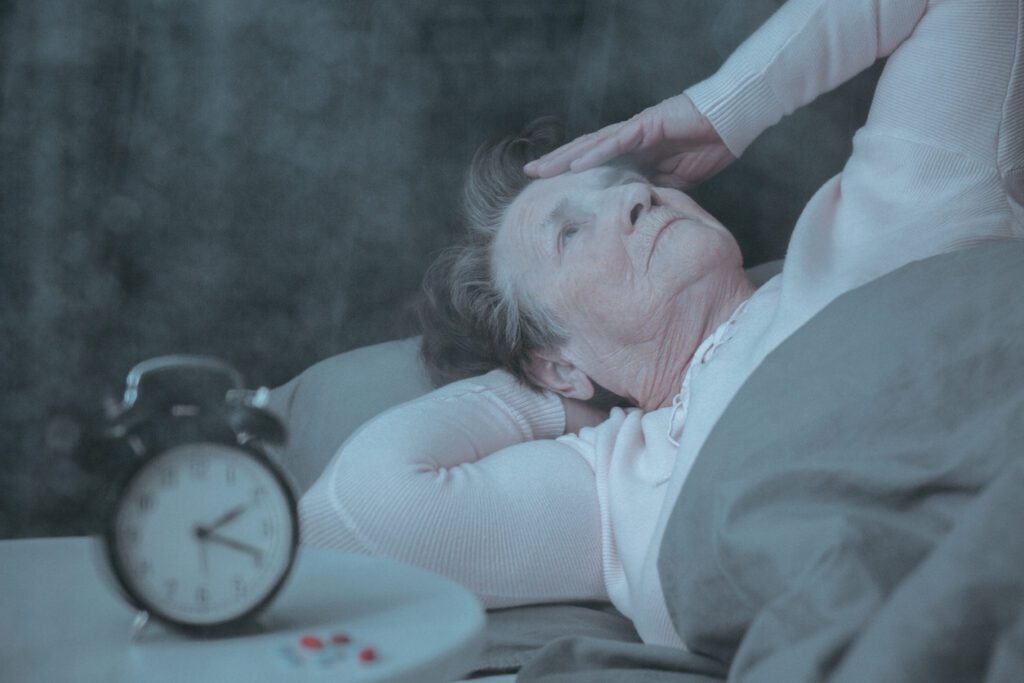5 Tips to Improve Sleep in Dementia
 Those suffering from dementia or Alzheimer’s often experience poor sleep, including frequent waking, troubled sleep, or being awake at night. That’s because dementia causes changes in the brain related to sleep. In fact, as many as seven out of 10 people with dementia experience sleep issues, according to the Centers for Medicare and Medicaid Services.
Those suffering from dementia or Alzheimer’s often experience poor sleep, including frequent waking, troubled sleep, or being awake at night. That’s because dementia causes changes in the brain related to sleep. In fact, as many as seven out of 10 people with dementia experience sleep issues, according to the Centers for Medicare and Medicaid Services.
Those statistics are troubling when one considers that good sleep slows cognitive decline, improves mood, prevents falls and injuries, and helps to balance the sleep-wake cycle. Even more problematic is that the insomnia creates a vicious cycle where dementia worsens sleep and poor sleep worsens dementia.
The first step in trying to improve sleep patterns is to try to figure out how bad the situation is. Of course, if you’re the caregiver, you might be up with the person at night and have a first-hand knowledge of the severity of the problem. That’s especially the case if you share a bed with the individual. You could also use a monitor like the Gardeen system to track his or her sleep. (Gardeen allows you to track what is going on with someone when you can’t be there in person. For example, you can see whether the individual is sleeping or is active, where his/her gait speeds and wellness levels are at, and whether any potential fall risks can be prevented.)
Additionally, you could be on the lookout for the following symptoms of sleep deprivation: excessive daytime sleeping, increased confusion, trouble finding the right words, aggression, falling out of bed at night, or having obvious nocturnal activity. Examples of troubled sleep include waking up three or more times during the night, waiting more than an hour to fall asleep, or taking more than 30 minutes to fall back asleep.
The best way to help promote a better night’s sleep is by preparing for it all day. Here are five evidence-based tips to help you do just that:
- Pay attention to lighting. Natural light is what allows our minds to maintain a healthy sleep-wake cycle. Be sure that your older adult is getting enough light during daytime, and darkness at nighttime. One way to do this is to use a light therapy lamp in the mornings and to be sure the curtains or blinds are closed at night.
- Be active during the day and exercise for at least 30 minutes. This could include walking, doing seated exercises, working on chores, or lifting weights or canned goods. Just be sure that exercise is done at least four hours before bedtime. By staying active throughout the day, your senior will be tired by bedtime.
- Take care of any physical needs before tucking the person in. Check if the individual is comfortable and in the mindset of being ready for bed before s/he actually goes to bed. This means going to the bathroom, brushing teeth, getting in comfortable pajamas (or even skipping pajamas if that’s more comfortable), and adjusting the temperature. It’s important to consider the person’s preferences and routine, not just your own convenience. The goal is that the individual doesn’t feel the need to get up during the night.
- Play relaxing sounds to wind down before and during bedtime. Pick something that’s low, slow, and without lyrics. This could include static white noise, nature sounds, or music. Interestingly, listening to music has been proven to increase REM stages and deep sleep, which results in restored sleep, relaxed muscles, and lowered blood pressure. Try to avoid listening to the TV, audiobooks, or podcasts around bedtime, since to those with dementia, voices can often be distracting, energizing, or scary.
- Use aromatherapy and hand rubs. Breathing in certain essential oils, such as lavender, sweet orange, and cedarwood, can help those with dementia to have longer uninterrupted periods of sleep at night. You can diffuse the oils, put a few drops on a pillowcase, or use an aromatherapy lotion. In fact, it’s been shown that giving hand rubs with aromatic lotions at bedtime can help people relax and sleep better at night.
It goes without saying that when your loved one sleeps better, you’ll sleep better too. For that reason, it’s definitely worth your while, both for your sake and the older adult’s, to experiment with and consider the various sleep-inducing options above.
